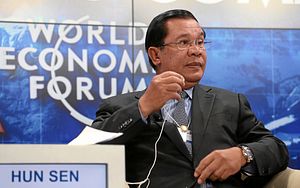Efforts to prosecute Cambodia’s ruling elite in the International Criminal Court (ICC) for crimes against humanity were bolstered after the court ruled company executives could be tried for land grabbing and environmental destruction.
The decision from The Hague is a significant policy change within the internal ICC prosecution process for selecting and prioritizing cases.
Since opening its doors 14 years ago, the ICC has focused mainly on crimes committed in armed conflicts such as crimes against humanity, among other war crimes. Alleged atrocities committed for profit in peacetime had been left aside by the ICC.
This policy change includes crimes that “are committed by or result in the destruction of the environment, the illegal exploitation of natural resources, or the illegal dispossession of land.”
Gillian Caldwell, Global Witness Executive Director, said the decision shows that the age of impunity – where communities are chased off their land and the environment trashed as an accepted way of doing business – was coming to an end.
“Company bosses and politicians complicit in violently seizing land, razing tropical forests or poisoning water sources could soon find themselves standing trial in the Hague alongside war criminals and dictators,” she said.
Two years ago, lawyers filed a criminal complaint against Cambodia’s “ruling elite” at the ICC alleging that crimes against humanity had been committed by authorities responsible for widespread land grabbing.
The filing is widely being seen as a test case that human rights groups hope will set a legal precedent with ramifications for land grabbers everywhere.
Lawyers for Global Diligence LLP, representing ten filing victims, say that about 777,000 Cambodians people had been affected by land grabbing and that this amounts to a crime of forcible transfers under the ICC statute.
It claimed 145,000 people, or about one percent of the population, had been forcible transferred from Phnom Penh alone, by 2012.
An initial assessment on whether to open a preliminary investigation through the ICC’s Office of the Prosecutor, which would then send an investigation team to Cambodia, was expected to take three to six months.
However, lengthy legal delays followed. But just last week, lawyers stepped-up criminal proceedings, announcing plans to add the killing of independent analyst Kem Ley to the existing Cambodian case under consideration by the ICC.
He was shot twice from behind on July 10, three days after London-based Global Witness released a report detailing the fabulous wealth and corporate assets held by the family of Prime Minister Hun Sen.
His death also followed a crackdown on dissent by the prime minister ahead of commune elections next June and general elections in July, 2018.
Twenty-nine supporters and members of the opposition Cambodian National Rescue Party (CNRP) have faced legal action with 14 jailed.
CNRP leader Sam Rainsy has fled into exile after a long-dormant defamation suit was ressurected and he was threatened with jail. His deputy, Kem Sokha, has been tried and sentenced to five months behind bars in absentia, in a case that involves allegations of prostitution, and he remains holed-up in CNRP headquarters.
Analysts said the government was unlikely to arrest him until all avenues of appeal have been exhausted. The opposition claims all the charges were untrue and politically motivated, which might also be of interest ICC prosecutors.
“This policy opens the door for the Prosecutor to take the Cambodia case,” Global Witness spokeswoman Alice Harrison told The Diplomat.
“This bodes very well for the Cambodia case in our opinion. And sends a clear message that the ICC Prosecutor is willing to take a progressive position to deal with some of the most serious human rights challenges of our age.”
Luke Hunt can be followed on Twitter @lukeanthonyhunt

































